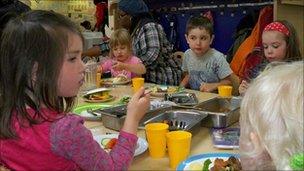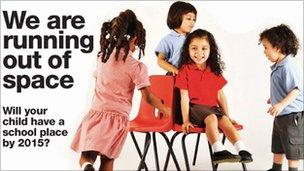Lambeth 'running out of space' for primary children
- Published

Some Lambeth parents say they are worried they will struggle to find places for their children
"We are running out of space. Will your child have a school place by 2015?"
The message in bold type on the leaflet posted through front doors in the south London borough of Lambeth is stark.
Local councils are under a statutory obligation to provide every child with a primary school place.
But some, particularly in London, are starting to voice their concerns about a possible shortfall of primary school places around England.
So is Labour-run Lambeth just scaremongering - having a political punch at the coalition government and Education Secretary Michael Gove - or is there some substance to its claims?
Lambeth says demand for places in some parts of the borough has increased by 40% in two years.
'Really worried'
The council blames rising birth rates, families moving into the borough while others are staying put and the success of its schools.
The recession too is a factor, it says, with better-off parents feeling the squeeze and opting not to go private.

Lambeth Council predicts it will run out of primary school places by 2015
At the Effra Nursery in Brixton, some of the toddlers' parents believe the prospect of five-year olds having to stay at home is not an exaggeration.
Mother-of-four Maggie Owolade says parents are "really worried".
"If they do find a school it will be a long, long way away. Historically, it used to be about your first choice of school but now it's about 'is there going to be a place at all?'"
"It's happening already," says stay-at-home father Thom Chesser, who has two children and another on the way.
"I know parents who are getting into their fifth or sixth school, or not even a school they chose on their application forms.
"They're having to travel across the borough to take their children to school and if you have other commitments that's not always feasible."
The national birth rate has been rising - Office for National Statistics figures show it was 63.7 live births per 1,000 women of childbearing age in 2009, compared with 54.7 in 2001.
The Department for Education says primary school numbers have been falling for the past decade, but projects that from 2010 to 2018, they will rise by 14%.
However, the estimated rises vary significantly between localities, shaped by factors such as movement between areas, economic changes, migration and the make-up of the population.
London, the east and south-east are expected to feel the squeeze the most, but metropolitan boroughs throughout the country are likely to face pressure too.
'Devilishly difficult'
Bristol Labour councillor Sean Beynon says his ward is already affected.
"The city needs to find several thousand extra school places in the next four years.
"The council seems to be looking at putting in a large amount of modular accommodation - which is a posh way of saying Portakabins.
"This is not an ideal solution," he says, to what he considers a "devilishly difficult" problem.
And further north, Sean Ell, a Conservative councillor in Wigan, says that new housing developments in some areas will "place extra burdens on local facilities".
"We need to get some financial support from the government to develop existing schools and build new schools in the area," he says.
'Wasting vast sums'
The Department for Education says it has allocated £800m this year for local authorities to spend on precisely this problem.
They say the issue has been ignored for too long, and accuse Labour of "wasting vast sums" on bureaucracy in its Building Schools for the Future (BSF) programme of secondary school rebuilds.
The DfE says that, despite a 60% cut in education capital spending over the next four years, the coalition is still spending more per year on school building work than the previous government did in its first two terms.
Labour counters that when it came to power in 1997, it inherited a legacy of underinvestment in schools.
It accuses Education Secretary Michael Gove of making a "complete mess" of the schools capital budget, not least in axing BSF, including halting planned rebuilds for hundreds of secondary schools.
A government-commissioned review of school building recommended this April that a better system be put in place to prioritise schools' building needs and to develop standardised designs that could be built more cheaply.
But Lambeth says it needs more money now. It has received £52m over the past five years, but is asking for £50m over the next two.
"We've identified schools that would like to expand," says Pete Robbins, Lambeth's cabinet member for children and young people.
"We're putting in bulge classes but we want to have permanent expansion.
"We've got our plans all ready but the one thing we're lacking is the 'readies'. We need the money!"
- Published18 May 2011
- Published8 April 2011
- Published17 March 2011
- Published1 March 2011